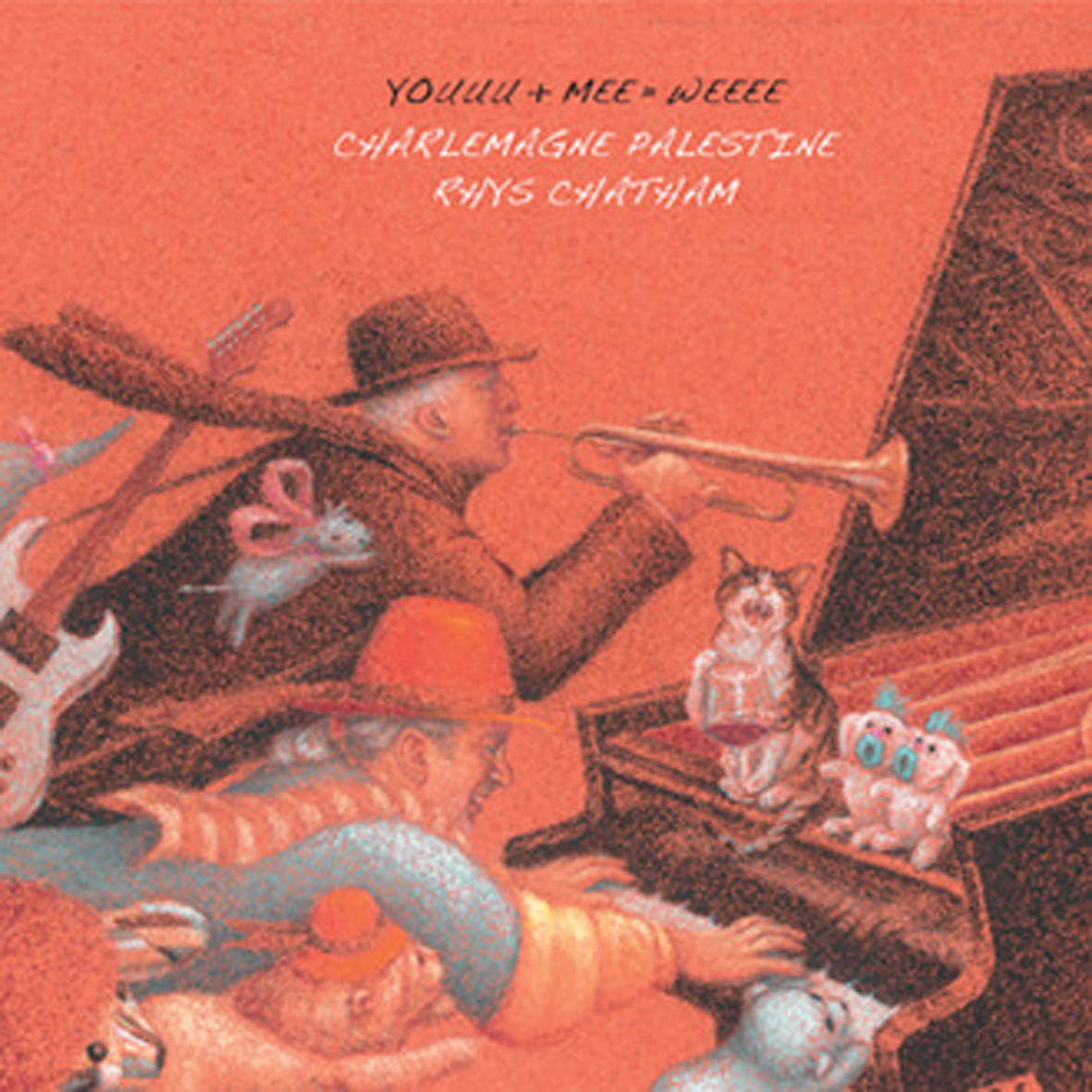 A collaboration between these two avant-garde elder statesmen could have gone any number of ways, given Chatham’s late-career embrace of the trumpet and Palestine’s unrelenting eccentricity.  For the most part, however, the sprawling, nearly three-hour Youuu + Mee is a huge success, taking minimalist drone into some very twisted, unexpected, and dark places (though Palestine's occasional eruptions of yowling vocals remain very much an acquired taste/potential deal-breaker).
A collaboration between these two avant-garde elder statesmen could have gone any number of ways, given Chatham’s late-career embrace of the trumpet and Palestine’s unrelenting eccentricity.  For the most part, however, the sprawling, nearly three-hour Youuu + Mee is a huge success, taking minimalist drone into some very twisted, unexpected, and dark places (though Palestine's occasional eruptions of yowling vocals remain very much an acquired taste/potential deal-breaker).
Youuu + Mee is roughly divided into three hour-long pieces spanning three CDs, prosaically entitled "First," "Second," and "Third."  As it happens, the first piece is my favorite of the lot for a number of reasons.  It is built primarily upon an endlessly rippling two-note piano motif coupled with sustained trumpet drones from Chatham.  After about ten minutes or so, Palestine joins in with some sort of ritualistic approximation of Tuvan throat-singing in his trademark countertenor.  Though that is exactly the sort of thing that could potentially derail the song for me, the singing quickly disappears and Chatham's looped trumpet begins to resemble a threatening swarm of insects while the previously simple and innocent piano ripples steadily drift into darker and darker territory.  It basically sounds like La Monte Young being engulfed in a cloud of angry bees, which is a very cool niche that I do not think anyone else has attempted to fill yet.  Admittedly, there is a bit more to it than that, as the piece is not just an exercise in escalating intensity and insect-mimicry: the duo actually do a very fine job of building and releasing tension throughout, even if the "bee attack" parts are unquestionably the highlights.  That said, I always enjoy Palestine's intense, ringing, and overtone-friendly style of minimalist piano playing, especially when it veers into more dissonant territory.
For "Second," both musicians switch to different instruments, with Charlemagne transitioning to organ and Rhys picking up an electric guitar.  Initially, the two musicians limit themselves to a single slowly strummed chord being repeated over an unchanging organ drone, but Chatham's guitar contribution slowly becomes more complex as he employs his looping pedal.  To his credit, however, Chatham takes his playing in a very different direction that I would have expected, massing his notes into a stuttering, prickly thicket of overtones rather than anything melodic or structured.  For the most part, Palestine keeps his drones fairly tame, patiently shifting chords until the mood darkens once again around the 15-minute mark with an unexpected plunge into a minor key.  Though Charlemagne quickly and seamlessly reverts back to less-threatening chords, that first hint of menace proves to be a harbinger of where the piece ultimately heads.  "Second" takes a long time to become fully unnerving though, as there are some passages of sublime beauty along the way whenever Palestine hits an unexpected chord change or when Chatham allows his guitar noise to drop out to leave only plucked harmonics.  Most of the pleasure, however, lies primarily in hearing the piece transform from its placid beginnings onto a steadily darkening storm over the course of its 60-minute arc.
The final piece is yet another organ-based excursion, with languorous sustained notes from Chatham's trumpet providing shifting coloration for Palestine's lush, static drone.  For a long time, "Third" is quite a conventionally beautiful piece, warmly undulating without a trace of dissonance and gradually embellished by an undercurrent of twinkling piano.  Even Palestine's vocals are kind of enjoyable when they first arrive, transforming the piece into something resembling an exotic mass.  Curiously, Chatham returns to his guitar around the halfway point and the piece morphs into a near-reprise of "Second," albeit one with busier, more melodically active piano and a visceral plunge into the lower octaves.  Eventually it returns to yet another reprise, however, this time a reversion to its own earlier incarnation...but not before Palestine unleashes a wildly unexpected and feral-sounding vocal crescendo that makes me fear for Chatham's safety.  Fortunately, he quickly calms back down and final third of the pieces ebbs to a warm and beautifully rippling conclusion.
The only real criticism I can muster for this epic is that it sounds very much like a Charlemagne Palestine album, with all of the normal caveats that entails: his vocals can definitely be grating at times, but he is also an iconoclastic visionary, so I tend to give him a pass on his rougher edges.  They are definitely there though. He is kind of like an especially delicious meal that has a few large shards of glass in it.  That said, Youuu + Mee sounds like an especially strong Palestine album, which I did not expect at all, as most of the Charlemagne Palestine albums that I love are not particularly recent.  For his part, Rhys Chatham proves to be an excellent foil for a very strange and complicated artist, which is no small feat considering both the size of Palestine's personality and the scale at which Chatham normally works (performing solo is presumably very different than composing for massive guitar ensembles).  Also, neither man plays it at all safe: this is certainly a tour de force, but it is at times a very dissonant and nightmarish one.  Which, of course, is exactly what I would hope for: there are scores of people making pleasant drone albums, so there is no point in two artists of this caliber covering that territory when there is far more ambitious, ritualistic, and uneasy terrain left to discover.
 
Read More

